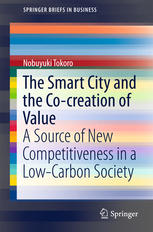

Most ebook files are in PDF format, so you can easily read them using various software such as Foxit Reader or directly on the Google Chrome browser.
Some ebook files are released by publishers in other formats such as .awz, .mobi, .epub, .fb2, etc. You may need to install specific software to read these formats on mobile/PC, such as Calibre.
Please read the tutorial at this link: https://ebookbell.com/faq
We offer FREE conversion to the popular formats you request; however, this may take some time. Therefore, right after payment, please email us, and we will try to provide the service as quickly as possible.
For some exceptional file formats or broken links (if any), please refrain from opening any disputes. Instead, email us first, and we will try to assist within a maximum of 6 hours.
EbookBell Team

4.3
68 reviewsThe original point that differentiates this text from otherwise similar texts is that it looks at the building of smart cities from the viewpoint of an interchange of knowledge among companies in different industries, or “Ba” as shared context in motion, and emphasizes that the resulting value becomes a source of new corporate competitive advantage. In recent years numerous publications have appeared that analyze smart cities from various perspectives including urban planning and administration, network theory, and innovation. However, few are academic texts that approach the subject from the viewpoint of corporate competitive advantage against a theoretical background in management studies, as this one does. This book is the first full-scale academic work to analyze smart cities from the viewpoint of corporate competitive advantage. Research into corporate competitive advantage includes the positioning and the resource-based views, with the former focusing on companies’ external environment and the latter on their internal resources. Although these theories’ foci of attention necessarily differ, they both developed as tools for analyzing companies’ relative merits and their chances of succeeding in the marketplace, and they take the common premise that competitive advantage is built through competition among companies. In contrast, this book sees corporate competitive advantage as arising not through competition but through “co-creation” among companies. It differs in its approach from existing theories in thinking that emphasizing co-creation over competition enables an analysis that better describes actual conditions when considering smart cities and corporate competitive advantage. Put another way, when new values arise from attempts to exchange and fuse knowledge, expertise, and other factors at the “ba” where companies from different industries collaborate, these values are surely brought about through co-creation among companies. Another point regarding this book’s original perspective on competitive advantage is its emphasis on the relationship between the creation of social value and competitive advantage. The question of the extent to which socially useful values can be created in the markets of the 21st century is closely linked to corporate competitive advantage. The issues of building smart cities and corporate competitive advantage are themes that this perspective can firmly grasp. This book intends to take up three different projects from among the smart-city building developments taking shape in Japan, and undertake case studies based on the theoretical framework outlined above. The central themes will analyze the mechanism of co-creation among companies and the relationship of created value to competitive advantage. This analysis aims to demonstrate one model relating to corporate competitive advantage in the 21st century.